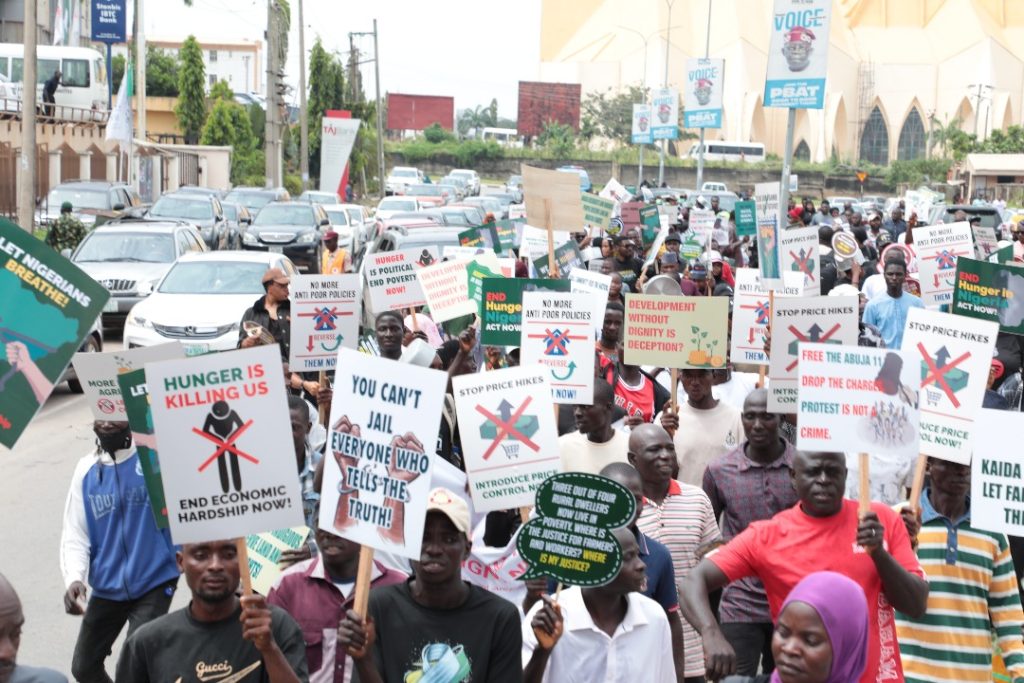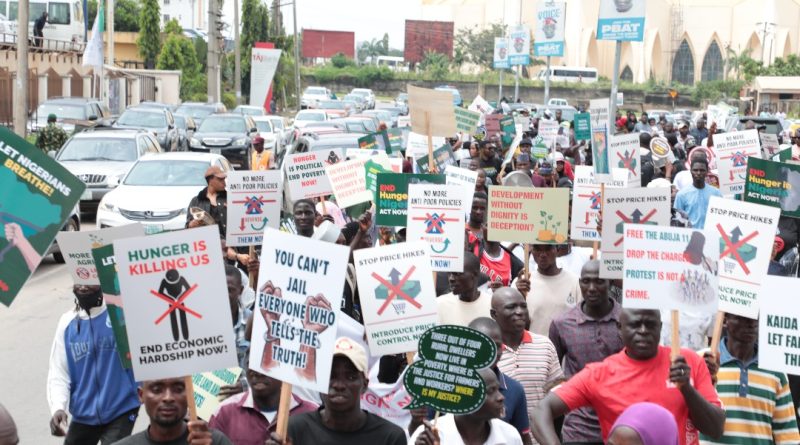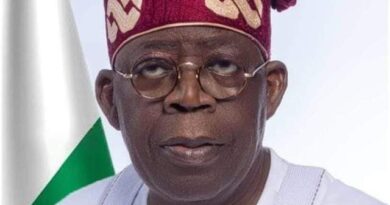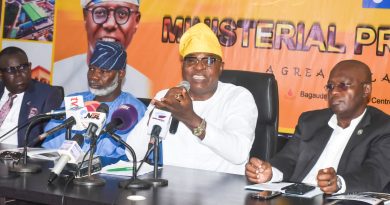End Poverty Protesters Storm Abuja
By Bukar BOLORI
Thousands of Nigerians took to the streets of Abuja, the country’s capital on Friday protesting high cost of living in the country, demanding an end to social and institutional poverty.
The protest which is said to be a call to action was also held simultaneously in Lagos, Yola, Yobe, Nasarawa and other part of the country.
The peaceful protest in Abuja kicked off with a procession from the Labour House, seeing many wielding placards with various inscriptions walking through the streets to the Federal Ministry of Finance and then back to the Labour House.

Some of the inscriptions on the placards showed: “Our pots are empty because the system is broken!”; “We march not just for food but for justice, dignity and equality”; “President Tinubu, we cannot eat promises! Feed us with Justice and Good Governance!”; “We beat our pots today because hunger beats us every day!”; “Empty Pots, Empty Promises! We can’t cook hope!”; “We refuse to normalize poverty in a nation this rich!”; “We are MOTION- Moving from Pain to Purpose!”“A just and equitable Nigeria is possible… But only when citizens rise! I rise for myself and my future”; “Three out of four rural dwellers now live below the poverty line! They are fellow Nigerians!”; “”139 million Nigerians in poverty and counting, Enough is Enough!”;”We’re done with Emotion! It is time for motion!”; “Release funds for Agriculture now! Our farms can’t survive on Speeches!”; “When the cost of food rises faster than wages, hunger becomes a national emergency!” “ Three out of four rural dwellers now live in poverty. Where is the justice for farmers and workers? Where is my justice?”
The protesters said there must be a corresponding transformation in the lives of over 100 million Nigerians living in abject poverty.
They said with more money going into the coffers of government lives should be better for citizens.
They called on all authorities at the Federal, States and Local Government to ameliorate the suffering of the people.
Before they set out on the walk, the Movement for the Transformation of Nigeria (MOTiON) was officially launched to push their agenda in commemoration of the International Day for the Eradication of Poverty.
Speaking at occasion, the Country Director, Actionaid Nigeria, Dr. Andrew Mamedu, said: “Today as we commemorate the international day for the eradication of poverty we must reflect on our strategies, and suggest innovative ways to address the deep rooted causes of poverty which include lack of fiscal transparency mostly at the sub-National levels, illicit financial flows that bleed an average of $18billion annually from Nigeria making Nigeria the highest contributor to illicit financial flows in Africa.
“We would not discountenance the efforts that the Federal Government has said it made in reaching 8.1million households with N330billion, we are however concerned that citizens appear to be excluded from the process of disbursement of funds to beneficiaries in terms of monitoring the budgeting process, release of funds and disbursement.
“In 2018, ActionAid Nigeria and other Civil Society Organisations were deeply involved and could report appropriately how funds were disbursed to beneficiaries. The government should also give opportunity to civil society organisations and media to carry out social audits on the people and households reached.”
Other demands made include addressing gaps in the electoral process including independent appointment of the INEC Chairman.
Actionaid Nigeria also called for adequate funding of Anti-Corruption Agencies in Nigeria.
Mamedu said: “The government should ensure that open tendering or open bidding, adhered to by all government agencies, will enable a more competitive process where all qualified and interested suppliers submit bids.
“The Nigerian government must urgently convene a National Poverty Summit to harmonise fragmented policies into a single, binding National Action Plan for food security and poverty eradication.
“Strengthen social protection systems that provide sustainable support for families, ensuring that no Nigerian is left behind in the fight against hunger and poverty.”
On his part, Femi Falana, a Senior Advocate of Nigeria who also addressed the protesters virtually said Nigerians have no business being hungry.
He noted that: “Today’s gathering carries a double significance. We are here to witness the formal launch of the Movement for the Transformation of Nigeria. A coalition of courageous citizens determined to end the cycle of bad government and structural poverty that has claimed our country. We also commemorate the International Day for the Eradication of Poverty. A day set aside globally to reaffirm the commitment of all nations and peoples to the dignity and welfare of the human person.
“The theme before us, “ending social and institutional maltreatment”, is not merely academic. It is a life or a new reality familiar to Nigeria. It compels us to confront the painful truth that our institutions are designed to serve the world, that our laws meant to protect are too frequently ignored, and that our society, rich in human and natural resources, continues to nurture poverty instead of prosperity.
“When we speak of social maltreatment, we refer to the denial of basic necessities, food, shelter, education, healthcare, and employment, which further end the majority of our people who live a life of needless suffering.
“When we speak of institutional maltreatment, we speak of the abuse, neglect, and inefficiency that have become endemic in the organs of state power, from the police station to the courts, from the ministries to our political sphere.”
He explained that: “Ending maltreatment, therefore, begins with reclaiming the idea that the Nigerian citizen is not a subject to be pitied, but a rights holder to be respected.
“It demands that public institutions exist not as instruments of oppression, but as guarantors of dignity.”
Falana said:“Our democracy became one of elections without accountability, representation without a consulate, democracy without a government.
He noted that: “The fight against bad treatment, therefore, is not a new demand, but a rather old moral obligation to insist that governance must serve humanity and that the institution must protect rather than punish.
“Now, history has taught us that no nation rises above the power factor of its institution. The challenge before us as we launch “Motion” is to ensure to clean mistakes of the past, that we turn our outcry into organisation, our protests into policy, and our hope into institutional transformation.
“Globally, we have agreed that we have set aside targeting issues of poverty globally. And in Nigeria, Nigeria is not left out. Two weeks ago, we had the debate around the World Bank figure that says 139 million Nigerians are living in poverty, holding, marching and saying, government, our ports are empty. Empty ports, empty promises, empty campaigns.
“And for us as citizens, we have a responsibility to hold government accountable. This is not a one-off activity. And we have said every last Tuesday of the month, Nigerians should come out, carry their pots and their pans and remind the government that people are hungry.
“We have no business in poverty. And if we do the right thing, our resources will work more for us. Accountability, corruption, let’s start prosecuting those that have been indicted.
“Let’s start prosecuting them. Let’s make sure that the school feeding programme that we have started and stopped, that we relaunch it, and it happens across all public primary schools in the country. Let’s make sure that the 139 million Nigerians that are living in poverty, that they get the cash transfer.
“139 million, let’s make sure that we ensure that we have free, credible elections that is not manipulated. If we do these things in our sixth demand, if we do these things, our citizens of Nigeria will be glad, will be happy, and we’ll see the result. There will be no need for us to do this.
“Yes, we are making little progress, but we have to do much more to be able to achieve this. Motion has come to stay, and we are going to hold the government accountable at every step of the way.”
The convener of the Motion (protest), Hawa Mustapha said Motion simply stands for Movement for the Transformation of Nigeria, saying enough is enough to suffering. We have no business being poor in a country of plenty.
“We have no business having 31 million Nigerians waking up without an idea of where the next meal is going to come from. We have no reason to have 11 million children on the streets of Nigeria not having food to eat, living with severe hunger. Whereas this is a country that is endowed with agricultural production.”
She explained that the idea of Motion is to say that, look, “Nigerians there are no Nigerians that are more Nigerians than the other. We all have a collective stake in this country called Nigeria. We have no other place to call home. She stated the six demands of the protesters to include: An end to hunger. We want the government to convey, as a matter of emergency, the people of Nigeria to come together and discuss how to deal with this situation of poverty in the midst of plenty.
“Secondly, we are also demanding that poverty or hunger is also partly a result of the lack of employment. We are demanding that within the next two years, the government puts in place strategic and concrete policies that will engage and create at least three million jobs. We are also saying that, look, enough of corruption.
“We also want a situation where the government continues the school feeding programme to our children, particularly primary school. And indeed, expand the scope and the number of children that are benefiting from the school feeding programme.
“We also want the government to also address this thing about the cash transfer should not be limited to 10 million people or 8 million people. Indeed, the 139 million people that are judged to be living in multidimensional poverty should immediately be enjoying certain social protection, including cash transfer, including access to education and access to basic health. So these are some of our demands and we are insisting that as Motion, as Nigerians, this is the beginning.
“We are not going to rest until this country that we call ours is truly ours in terms of the dignity of the people that live in this country.”




